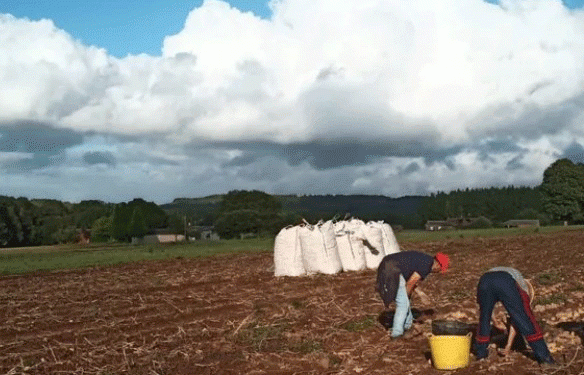According to the Spanish Ministry of Agriculture, Galicia led the nation in potato cultivation area in 2023, with 17,770 hectares, surpassing Castilla y León’s 16,934 hectares. Among these dedicated farmers is Óscar Riveiro, who began growing organic potatoes on just half a hectare in 2008 and has since expanded to 13 hectares of certified organic land. Riveiro cultivates the popular Kennebec variety and Agria potatoes, adapting to challenges posed by the region’s climate.
This year, the planting season started about a month and a half later than usual due to spring rains. Despite this delay, the crops have thrived, though the warm and humid conditions raise concerns about late blight outbreaks. “In organic farming, we have fewer crop protection tools to combat diseases. We use copper and algae-based foliar fertilizers to keep the plants strong, minimizing the impact of the fungus,” Riveiro explains. He participates in the Algaterra project, which produces inputs for both organic and conventional horticulture using seaweed, particularly waste products from the food industry.
The use of algae-based fertilizers is part of a broader strategy to manage late blight. These fertilizers are rich in nutrients and natural compounds that enhance plant health and resistance to diseases. Research has shown that seaweed extracts can boost plant immune responses, making them less susceptible to pathogens like Phytophthora infestans, the causative agent of late blight. This approach is especially crucial in Galicia, where frequent rains create an ideal environment for the disease.
Galicia’s potato farmers also face the challenge of Tecia solanivora, the Guatemalan potato moth, a quarantine pest identified by the EU. Since its detection in August 2015, it has spread to five regions in Galicia, particularly affecting the provinces of Lugo and A Coruña. Farmers had to modify their storage facilities to prevent the moth from spreading, and phytosanitary controls were implemented. Despite these measures, the pest continues to pose a threat to potato crops.
Riveiro recalls, “Around Lugo, a farmer who grew a lot of organic potatoes had to stop planting about 8-9 years ago due to the potato moth. Many still grow potatoes alongside other organic vegetables, but Riveiro Ecológicos remains one of the largest companies dedicated to organic potato farming in the region.”
Despite these challenges, the shift towards algae-based fertilizers and other innovative practices has helped improve yields. While organic farming doesn’t achieve the 25-30 tons per hectare typical of conventional farming in Galicia, under normal conditions, it reaches 18-20 tons per hectare. This is a significant improvement compared to seasons affected severely by late blight, where yields can drop drastically.
The adoption of algae-based fertilizers represents a promising advancement in the fight against late blight in organic potato farming. By enhancing plant resilience and reducing reliance on traditional crop protection chemicals, Galician farmers like Óscar Riveiro are leading the way in sustainable agriculture. This approach not only improves crop yields but also supports the broader goals of organic farming: environmental stewardship and long-term soil health.







